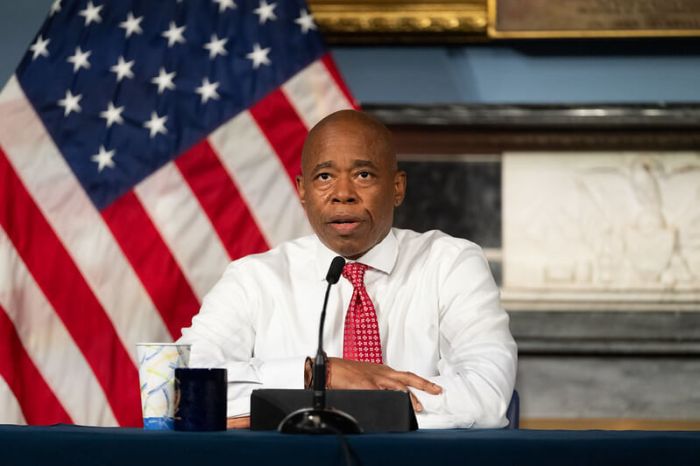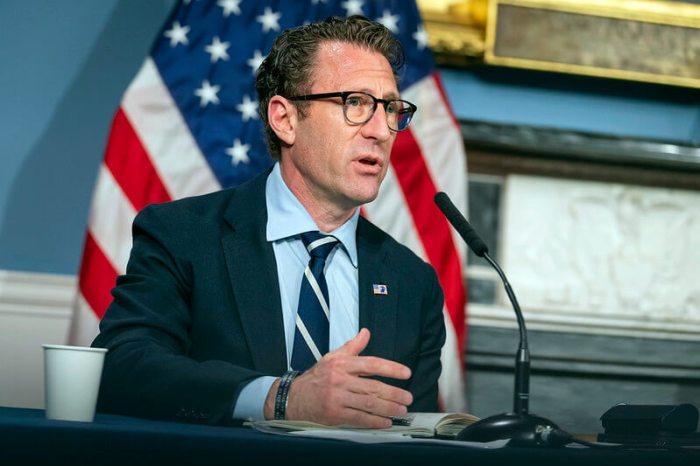Gov. Kathy Hochul’s office is backing Mayor Eric Adams’ latest effort to suspend a decades-old requirement that it provide shelter to anyone in need, according to a letter obtained by amNewYork Metro.
Hochul’s attorney Faith Gay said the state is in “support” of the city’s push to change the long-standing mandate — known as the right-to-shelter — in the letter addressed to a Manhattan Supreme Court judge overseeing the case on Wednesday. The city’s latest request, filed via a letter last week, asked the court to exempt it from the shelter requirement under certain circumstances as a means of freeing it from continuing to provide shelter to tens of thousands of newly arrived migrants in perpetuity.
The judge, Gerald Lebovits, was assigned to the right-to-shelter case last week after the previous judge presiding over the matter, Erika Edwards, recused herself late last month.
In the missive, Gay called the city’s request to modify the 1981 consent decree that established the right-to-shelter — Callahan v. Carey — “measured and appropriate” given the influx of more than 122,000 migrants to the five boroughs in the past 18 months. Over 63,000 of those newcomers are still in the city’s care.
“Despite unprecedented resources deployed by the city and the state to assist the newly arrived migrants, the current situation is not sustainable,” Gay wrote. “The state defendants agree that flexibility is imperative to address the surge of migrant arrivals.”
Gay also reiterated one of the city’s core arguments for altering the right-to-shelter: the consent decree it is based upon is over 40 years old and did not anticipate the size and speed of the city’s current migrant influx.
“The city entered into the consent decree over forty years ago,” Gay said. “The parties to the consent decree could not have contemplated that the city would experience the influx of so many migrants in such a short period of time. The consent decree is now placing unforeseen operational constraints on the city as it works to manage this challenge.”
While Hochul has not been shy about publicly questioning the right-to-shelter before, the letter marks her administration’s first formal move in supporting the city’s efforts to suspend it.
The city’s latest request, which was revised from earlier motions it filed with the court in May and July, lays out two criteria that must be met to exempt the city from its shelter obligations: when either the city or state have declared certain kinds of states of emergency and when the number of single adults entering shelter each day is 50% higher during the declared state of emergency, or for the two preceding weeks, than before the emergency.
The formula would be calculated, according to the city’s letter, by evaluating average shelter entries for single entries over the previous two years, excluding times of other declared housing-related emergencies.
However, immigrant and homeless advocates have slammed the Adams administration’s most recent request to the court. Adriene Holder, chief attorney of the civil practice at the Legal Aid Society, which represents the Coalition for the Homeless in the case, said the city’s requested change would “obliterate” the right-to-shelter.
“Working with both Albany and City Hall, we’ve identified various resources to help the city meet this moment, but our leaders have failed to follow through on these solutions,” Holder said, in a Wednesday statement. “Instead of pursuing an outcome that will only lead to mass street homelessness and increased suffering, Governor Hochul and Mayor Adams must fully execute these additional steps to increase shelter capacity and transition homeless New Yorkers from shelter to permanent housing.”
Josh Goldfein, a Legal Aid staff attorney, last week took aim at the administration’s proposed formula for determining when it would be freed from the shelter obligations.
“What are we going to do? We’re going to set up a counter and when you know the right number person crosses the line, then suddenly there’s no more right-to-shelter,” he asked. “That seems like not the way to operate a system that is meant to protect human beings from injury and death.”
The mayor’s office did not respond to a request for comment by publication time.


































